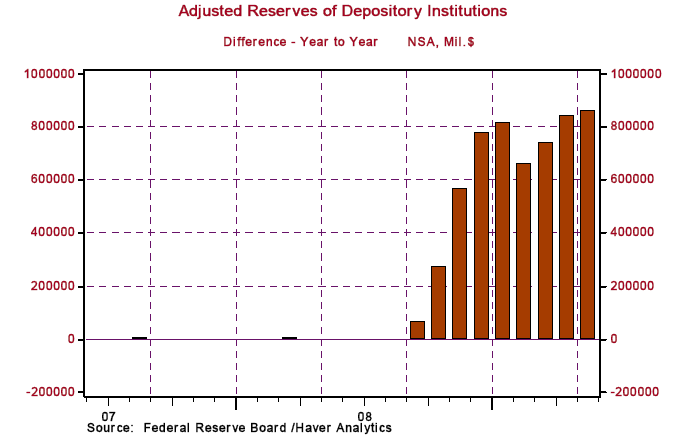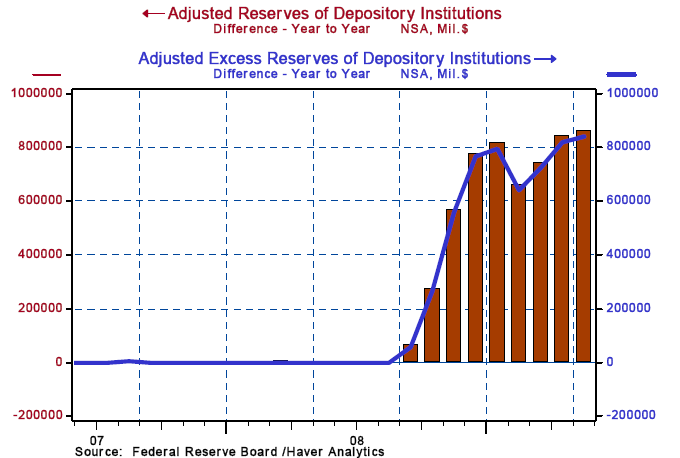Objective Analysis of the Increase in the Fed's Balance Sheet
Interest-Rates / Credit Crisis 2009 Jun 29, 2009 - 05:42 PM GMTBy: Paul_L_Kasriel
 In recent weeks two prominent economic commentators - Arthur Laffer and Alan Greenspan - have warned about the inflationary potential emanating from the unprecedented increase in the Fed's balance sheet. Yes, as shown in Chart 1, reserves created by the Fed have increased by a staggering $858 billion in the 12 months ended May. But excess reserves on the books of depository institutions have increased by almost as much, $842 billion (see Chart 2). So, in the 12 months ended May, 98% of the increase in reserves created by the Fed has simply ended up as idle reserves on the books of depository institutions.
In recent weeks two prominent economic commentators - Arthur Laffer and Alan Greenspan - have warned about the inflationary potential emanating from the unprecedented increase in the Fed's balance sheet. Yes, as shown in Chart 1, reserves created by the Fed have increased by a staggering $858 billion in the 12 months ended May. But excess reserves on the books of depository institutions have increased by almost as much, $842 billion (see Chart 2). So, in the 12 months ended May, 98% of the increase in reserves created by the Fed has simply ended up as idle reserves on the books of depository institutions.
Chart 1

Chart 2

Yes, the bulk of the reserves the Fed has created are sitting idly on the books of depository institutions for now, but what if these institutions begin to lend them out in the future? Will not this result in an explosion of bank credit and the money supply, the raw ingredients of accelerating inflation - some might say the very definition of accelerating inflation? Why, yes, if the Fed were stand idly by. If, however, the Fed wished to "neutralize" these excess reserves, it has the means to do so. The Fed now pays interest on reserves. If it observed an undesired "activation" of these hundreds of billions of dollars of excess reserves, it could hike the interest rate paid on excess reserves. Why would depository institutions lend more at the same loan rate when the risk-free rate they could earn from the Fed on excess reserves had risen? They would not. So, the increase in the rate paid by the Fed on excess reserves would induce depository institutions to hike the interest rates charged on loans.
All else the same, the quantity of credit demanded by the public would decrease and, therefore, bank credit and the money supply would not increase. But what about the federal government? Its demand for credit is not sensitive to the level of interest rates. Yes, but the Fed could continue to raise the rate it pays on reserves until the quantity of credit demanded by the private sector falls sufficiently to offset the increased demand for credit by the federal government. But might this imply a substantial increase in interest rates? Yes, it might, depending on the sensitivity of private-sector credit demand and the amount of borrowing by the federal government. Would not this "crowding out" of private sector borrowing by federal government borrowing be a negative for future productivity and economic growth? Yes. But that's a different issue.
The point I am attempting to make in this commentary is that the increase in the Fed's balance sheet in the past year is not currently inflationary and need not lead to higher future inflation. Whether the Fed has the will or the skill to prevent the current increase in its balance sheet from manifesting itself in future higher inflation also is a different issue.
Do Banks Need to Cleanse Their Balance Sheets to Start Lending?
Much is being made of the fact that the Public-Private Investment Program (PPIP) has yet to get off the ground and that this program delay or failure could restrain banks from restarting their credit creation. I do not want to get into the nitty-gritty of numbers on this issue (ugh!), but rather want to deal with concepts. Whether toxic assets remain on the books of banks or are sold at a loss to other entities is not the point. The point is whether banks have enough capital to resume the expansion of their balance sheets, i.e., create new credit. If a bank sells an asset at a loss into PPIP, it will have to raise new capital to make up for this loss. If a bank retains the toxic asset on its balance sheet and raises enough new capital to cover realistic future losses on the toxic asset, it makes no difference whether or not it sells the toxic asset.
Banks have been on a capital-raising tear in recent months. I do not know whether they have raised enough capital to cover their likely losses from retained toxic assets. But I do know that the key element in restarting credit creation by banks is not whether they sell assets to PPIP but whether they raise enough capital - sale or no sale.
Paul Kasriel is the recipient of the 2006 Lawrence R. Klein Award for Blue Chip Forecasting Accuracy
By Paul L. Kasriel & Asha Bangalore
The Northern Trust Company
Economic Research Department - Daily Global Commentary
Copyright © 2009 Paul Kasriel
Paul joined the economic research unit of The Northern Trust Company in 1986 as Vice President and Economist, being named Senior Vice President and Director of Economic Research in 2000. His economic and interest rate forecasts are used both internally and by clients. The accuracy of the Economic Research Department's forecasts has consistently been highly-ranked in the Blue Chip survey of about 50 forecasters over the years. To that point, Paul received the prestigious 2006 Lawrence R. Klein Award for having the most accurate economic forecast among the Blue Chip survey participants for the years 2002 through 2005.
The opinions expressed herein are those of the author and do not necessarily represent the views of The Northern Trust Company. The Northern Trust Company does not warrant the accuracy or completeness of information contained herein, such information is subject to change and is not intended to influence your investment decisions.
Paul L. Kasriel Archive |
© 2005-2022 http://www.MarketOracle.co.uk - The Market Oracle is a FREE Daily Financial Markets Analysis & Forecasting online publication.



